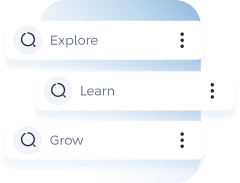
Refine Your Search
...
Explore Financial Academy
About the Academy
Discover our Rich, 60-Year Journey
Jadarat
A Comprehensive System for Skill and Knowledge Development
Governance
Meet our Inspiring Leadership
Success Stories
Check out our Clients’ Reviews and Testimonials


...


Dive into the dynamic world of financial technology with our comprehensive Fintech Bootcamp and Hackathon, designed for forward-thinking professionals eager to master the digital transformation reshaping the financial industry. This intensive program offers a unique blend of theoretical knowledge and practical experience, guiding participants through the intricacies of fintech innovations, data analytics, regulatory frameworks, and much more. From exploring the genesis and disruptive forces of the fintech revolution to mastering the latest in data analytics, AI, and regulatory frameworks, our curriculum is designed to empower you with the knowledge and skills crucial for crafting cutting-edge financial solutions. Distinguished by its comprehensive approach, the bootcamp covers a wide array of topics including NeoBanking, Embedded Finance, digital transformation strategies, and the nuances of Agile management, all tailored to the specific needs and regulatory conditions of the MENA region and beyond. Participants will have the unparalleled opportunity to learn from seasoned industry experts, engage in real-world case studies, and apply their learnings in a dynamic hackathon environment, culminating in the chance to pitch innovative fintech solutions to potential investors. Whether you aim to elevate your career, pivot to a fintech specialization, or launch a startup, our bootcamp offers the tools, insights, and network to propel you to the forefront of financial innovation. Join us to unlock a world of opportunities in the fintech domain, where you'll not only gain a competitive edge as well as becoming a part of an elite community driving the future of finance. Register now to redefine your career and shape the next wave of fintech innovation.
Dive into the dynamic world of financial technology with our comprehensive Fintech Bootcamp and Hackathon, designed for forward-thinking professionals eager to master the digital transformation reshaping the financial industry. This intensive program offers a unique blend of theoretical knowledge and practical experience, guiding participants through the intricacies of fintech innovations, data analytics, regulatory frameworks, and much more. From exploring the genesis and disruptive forces of the fintech revolution to mastering the latest in data analytics, AI, and regulatory frameworks, our curriculum is designed to empower you with the knowledge and skills crucial for crafting cutting-edge financial solutions. Distinguished by its comprehensive approach, the bootcamp covers a wide array of topics including NeoBanking, Embedded Finance, digital transformation strategies, and the nuances of Agile management, all tailored to the specific needs and regulatory conditions of the MENA region and beyond. Participants will have the unparalleled opportunity to learn from seasoned industry experts, engage in real-world case studies, and apply their learnings in a dynamic hackathon environment, culminating in the chance to pitch innovative fintech solutions to potential investors. Whether you aim to elevate your career, pivot to a fintech specialization, or launch a startup, our bootcamp offers the tools, insights, and network to propel you to the forefront of financial innovation. Join us to unlock a world of opportunities in the fintech domain, where you'll not only gain a competitive edge as well as becoming a part of an elite community driving the future of finance. Register now to redefine your career and shape the next wave of fintech innovation.

Banking
Capital Market
Insurance
Financing

Actuary
AI and Data Science +111
Actuary
AI and Data Science
AI and Data Science
AI and Data Science
AI and Data Science
Banking Operations
Claims
Clearing, Reconciliation and Settlements
Clearing, Reconciliation and Settlements
Clearing, Reconciliation and Settlements
Collateral / Asset Valuation
Collateral / Asset Valuation
Collateral Management
Collateral Management
Collateral Management
Collection and Recovery
Collection and Recovery
Collection and Recovery
Compliance, AML, and CTF
Compliance, AML, and CTF
Compliance, AML, and CTF
Compliance, AML, and CTF
Corporate Governance
Corporate Governance
Corporate Governance
Corporate Governance
Corporate Strategy
Corporate Strategy
Corporate Strategy
Corporate Strategy
Credit
Credit
Credit Modelling
Credit Rating Analysis
Custody
Customer Care
Customer Care
Customer Care
Customer Care
Cyber Security
Cyber Security
Cyber Security
Cyber Security
Dealing - Broking
Delivery Channels
Facilities Management
Facilities Management
Facilities Management
Facilities Management
Finance
Finance
Finance
Finance
Finance Operations
Finance Origination
Financial Advisory
Financial Advisory
Health Operations
Human Resources
Human Resources
Human Resources
Human Resources
Information Technology
Information Technology
Information Technology
Information Technology
Internal Audit
Internal Audit
Internal Audit
Internal Audit
Investor Relations
Investor Relations
Investor Relations
Investor Relations
Legal
Legal
Legal
Legal
Loss Adjustment/ Assessors
Marketing
Marketing
Marketing
Marketing
Origination and Structuring
Policy Operations
Portfolio Management
Portfolio Management
Portfolio/ Fund Management
Procurement
Procurement
Procurement
Procurement
Product Development
Product Development
Product Development
Product Development
Project Management
Project Management
Project Management
Project Management
Reinsurance / Retro Operations
Risk Management
Risk Management
Risk Management
Risk Management
Sales and Distribution / Intermediaries
Sell-Side Research
Sharia Advisory and Research
Sharia Advisory and Research
Sharia Compliance and Audit
Sharia Compliance and Audit
Treasury
Underwriting

Innovation and Digital Transformation

Not Exist

Lecture
Case Studies +3
Lecture
Case Studies
Brainstroming
Practical Implementation
Role-play
Pre Exam
Post Exam +3
Pre Exam
Post Exam
Discussion Panel
Research or Project
Mini Training
All job families in the financial sector
All job families in the financial sector +111
All job families in the financial sector
All job families in the financial sector
All job families in the financial sector
All job families in the financial sector
All job families in the financial sector
All job families in the financial sector
All job families in the financial sector
All job families in the financial sector
All job families in the financial sector
All job families in the financial sector
All job families in the financial sector
All job families in the financial sector
All job families in the financial sector
All job families in the financial sector
All job families in the financial sector
All job families in the financial sector
All job families in the financial sector
All job families in the financial sector
All job families in the financial sector
All job families in the financial sector
All job families in the financial sector
All job families in the financial sector
All job families in the financial sector
All job families in the financial sector
All job families in the financial sector
All job families in the financial sector
All job families in the financial sector
All job families in the financial sector
All job families in the financial sector
All job families in the financial sector
All job families in the financial sector
All job families in the financial sector
All job families in the financial sector
All job families in the financial sector
All job families in the financial sector
All job families in the financial sector
All job families in the financial sector
All job families in the financial sector
All job families in the financial sector
All job families in the financial sector
All job families in the financial sector
All job families in the financial sector
All job families in the financial sector
All job families in the financial sector
All job families in the financial sector
All job families in the financial sector
All job families in the financial sector
All job families in the financial sector
All job families in the financial sector
All job families in the financial sector
All job families in the financial sector
All job families in the financial sector
All job families in the financial sector
All job families in the financial sector
All job families in the financial sector
All job families in the financial sector
All job families in the financial sector
All job families in the financial sector
All job families in the financial sector
All job families in the financial sector
All job families in the financial sector
All job families in the financial sector
All job families in the financial sector
All job families in the financial sector
All job families in the financial sector
All job families in the financial sector
All job families in the financial sector
All job families in the financial sector
All job families in the financial sector
All job families in the financial sector
All job families in the financial sector
All job families in the financial sector
All job families in the financial sector
All job families in the financial sector
All job families in the financial sector
All job families in the financial sector
All job families in the financial sector
All job families in the financial sector
All job families in the financial sector
All job families in the financial sector
All job families in the financial sector
All job families in the financial sector
All job families in the financial sector
All job families in the financial sector
All job families in the financial sector
All job families in the financial sector
All job families in the financial sector
All job families in the financial sector
All job families in the financial sector
All job families in the financial sector
All job families in the financial sector
All job families in the financial sector
All job families in the financial sector
All job families in the financial sector
All job families in the financial sector
All job families in the financial sector
All job families in the financial sector
All job families in the financial sector
All job families in the financial sector
All job families in the financial sector
All job families in the financial sector
All job families in the financial sector
All job families in the financial sector
All job families in the financial sector
All job families in the financial sector
All job families in the financial sector
All job families in the financial sector
All job families in the financial sector
All job families in the financial sector
All job families in the financial sector
All job families in the financial sector
All job families in the financial sector
All job families in the financial sector
Purchase Program
( 0)Available
To preview individual and groups discount policy, Click Here
This provides you with the opportunity to select the available times that suit you best for participation in our program. These times represent slots during which we are ready to welcome you and provide assistance and guidance.





























Explore fintech revolution factors for historical industry insights
Examine disruptions and identify leading fintech companies.
Dive into current trends for a thorough industry understanding.
Recognize fintech innovation categories and examples.
Analyze successful fintech evolution, challenges, and opportunities.
Familiarize with NeoBanking business model and MENA region applications.
Case Study: Embedded Finance
Case Study: NeoBanking.

Identify disruptive Fintech business models impacting traditional finance.
Understand regional and local Fintech regulations, including bodies and sandboxes.
Gain insights into challenges and opportunities for startups in Saudi Arabia.
Examine Saudi BNPL and Crypto startups, analyzing their business models and regulatory requirements.
Case Study: BNPL
Case Study: Crypto
Guest speaker: Gain insights into challenges and opportunities for startups in Saudi Arabia.

Understand the data-point lifecycle, categorizing different types for analytics and machine learning.
Acquire knowledge of roles and responsibilities in the data domain, matching expertise with specific roles.
Differentiate between technologies and cloud architectures, assessing options based on use case pros and cons.

Evaluate technical stack options for a project, considering pros and cons to determine the most suitable technology.
Differentiate applications of analytics in finance, identifying common data tools used in the financial sector.
Recognize dataset examination by applying field-specific expertise and analytics principles to extract valuable information and create customer profiles.
Case Study: Credit Scoring

Understand the regulations and future trends in the Fintech sector.
Learn to identify and evaluate opportunities in the local market.
Learn about SAMA's and CMA’s regulatory sandbox, how the program works, and how to benefit from its framework.
Learn about how to apply and pass the evaluation process.
Learn about how successfully case studies operating in the sandbox

Understand the technical validation percentage needed for acceptance in SAMA and CMA’s Sandbox program.
Learn tips and tricks to validate technical solution with low to no investment.
Technical validation sprint within SAMA and CMA Sandbox before acceptance through existing approved SAMA and CMA Sandbox startups
Learn about how to present the learnings from the validation to the selection committee

Grasp Agile methodologies' definition and principles, recognizing their benefits and distinguishing the Agile mindset from traditional project management.
Understand the unique characteristics of development cycles, identifying advantages and disadvantages of each type and distinguishing between them effectively.
Learn to create user stories, conduct daily stand-ups, and retrospectives, applying Agile methodologies in daily work.
Comprehend problem-solving using Agile methodologies, applying Agile practices to real-world scenarios and collaborating effectively in a team.
Case study: AI in Finance

Introduce Artificial Intelligence, Data Science, and current Machine Learning developments, showcasing how AI empowers financial organizations and clarifying associated terms and concepts.
Recognize the significance of AI in the Financial Industry, leveraging current AI and data technologies to address challenges within the financial sector.

Explore ML model categories, applications, and fundamental concepts in finance to understand how these models address specific problems.
Guest speaker: Grasp the risks, limitations, and opportunities associated with adopting AI for enhanced utilization in the financial industry.
Acknowledge the technical and operational requirements for implementing AI in organizations, facilitating its effective use in jobs or startups.

Comprehend the concepts of process automation for more effective utilization in the financial industry.
Recognize the risks, limitations, and opportunities associated with adopting process automation for enhanced utilization in the financial sector

Gain insights from experts on emerging fintech technologies, exploring and discussing the latest trends and advancements shaping the industry.
Recognize the concept of process automation, understanding how it can facilitate growth for financial organizations.
Analyze operational costs and risks in finance, learning how process automation can mitigate challenges in financial organizations.

Grasp the fundamental principles of design thinking, acquiring foundational knowledge for ideation.
Recognize the significance of empathy in the design thinking process, emphasizing the customer-centric approach to identify pain points and understand Jobs To Be Done (JTDs).
Break down the concept of customer persona, applying it to identify target customer personas.
Utilize the value map of the value proposition canvas to design a solution concept, integrating AI applications to address customer needs and pains.
Apply feedback from trainers and peers to refine and enhance presentation skills, preparing for audience presentations.

Introduction to data visualizations and popular Business Intelligence tools, understanding the benefits and basic features of Power BI and Tableau.
Guided walkthrough of Power BI workflow, covering loading a table into the Query Editor, basic cleaning steps, and transitioning to the Data Model.
Practical application of turning clean, structured data models into visualizations, gaining hands-on experience in visualizing data.
Short workshop focusing on creating dashboards in Power BI, enhancing skills in presenting and interpreting data insights.

Gain proficiency in importing data, navigating the interface, and creating diverse data visualizations in Tableau, including graphs, calculations, dashboards, and stories. Understand aggregation types, data types, and distinctions between worksheet.
Utilize Tableau to address business questions from provided datasets, employing summary statistics, aggregation, table calculations, and calculated fields to extract concealed insights within the data.
Construct dashboards in Tableau, applying filters and advanced filters to multiple worksheets. Engage in parameter exercises and implement visual analytics best practices for effective data presentation.
Case study: Portfolio returns

Apply fundamental statistical concepts to analyze data, encompassing the calculation of descriptive statistics (median, standard deviation, etc.), outlier detection, and fitting a sample to a common distribution.
Utilize these concepts to analyze a synthetic dataset containing various hedge funds' portfolio returns. Participants will employ the covered metrics to discern differences in return patterns and recommend a hedge fund's portfolio based on expected .
Create effective data visualizations and charts that communicate statistical insights to a non-technical audience, leveraging the inherent properties of the data.
Case study: Data Visualization.

Identify and compute essential business metrics, using core Key Performance Indicators (KPIs) to assess the business conditions effectively.
Evaluate the reliability and representativeness of analytical insights, considering the assumptions and limitations of the models used. Recognize common errors in data analysis and communication.
Analyze a synthetic dataset featuring a startup's sales, marketing, and financial data. Calculate relevant metrics, visualize the results, and generate insights. Develop a comprehensive report summarizing the calculated metrics, explaining visualise

Apply session learnings to create a validation template, establishing a standardized process for testing and validating ideas within the design process. Ensure thorough testing and evaluation of all potential ideas before progressing.
Demonstrate effective and confident presentation of exercise outcomes to an audience. Incorporate constructive feedback from trainers and peers to enhance presentation skills.
Participants will pitch their ideas, recruiting others to join or joining existing ideas to form teams of 3-5 participants.
Guest speaker: Hear from experts to understand the regulatory environment of Fintechs in Saudi from a regulator perspective.

Grasp major technology trends in Fintech, understanding their industry impact and influence on business models. Stay updated on the latest developments to uncover new opportunities.
Explore real regional and international examples of tech applications in Fintech, gaining practical insights into their real-world applications. Understand successful Fintech business models through these examples.
Examine further real regional and international instances of tech applications in Fintech to apply learned lessons to personal Fintech projects and initiatives.
Fintech Case Study: Identity and Privacy technologies ( IDnow)

Examine how a prosperous Fintech company utilizes technology to generate value for customers and stakeholders. Apply best practices to design and implement your own Fintech solutions.
Acquire an understanding of navigating the regulatory environment for Fintechs in Saudi Arabia as a founder.
Evaluate the business model and technology application of a successful Fintech company. Identify key factors contributing to their competitive advantage in the fintech market.
Case Study: Insurtech (Lemonade)
Guest speaker: Understand how to navigate the regulatory environment of Fintechs in Saudi as a founder

Explore the concept and significance of digital transformation, analyzing potential impacts on the financial industry.
Formulate a vision and strategy for digital transformation, identifying areas for innovation and selecting suitable technologies.

Recognize the role of innovation in digital transformation, identifying various aspects of innovation capabilities crucial for the process.
Analyze human challenges inherent in digital transformation, strategizing effective approaches to address these challenges.
Create a Personal Plan for Digital Transformation aligned with professional goals, incorporating key concepts and skills acquired during the program.

Understand the vital skills and competencies required for launching and growing a successful Fintech startup in Saudi Arabia, identifying and developing the necessary capabilities for local market success.
Analyze the startup journey and explore various financing options for a Fintech venture, making strategic decisions regarding funding and business scaling.
Identify key steps and best practices for preparing a pitch deck and delivering a presentation to a VC for a Fintech startup.
Gain insights from an experienced Fintech venture investor about key fundraising principles, the fundraising process, and potential pitfalls in the domain, learning how to navigate them successfully.
Learn from an expert Fintech founder about the entrepreneurial journey, the challenges and opportunities of building and scaling a Fintech business, and best practices and lessons learned from their experiences.
Guest speaker: Learn from an experienced Fintech venture investor about the key principles, fundraising process and pitfalls of fundraising in this domain and how to navigate them successfully.
Guest speaker: Learn from an expert Fintech founder about the entrepreneurial journey, the challenges and opportunities of building and scaling a Fintech business, and the best practices and lessons learned from their experience

Problem description: Define the problem your product is solving and how?
Define the customer persona based on your design thinking learnings.
Validation checklist and questions (customer
Each team presents their short pitch.
The daily challenge winner is awarded.

Create a list of people to validate their idea with (must be matching the customer person, not less than 3 individuals)
Conduct research before interviewing regulatory expert.
Participants will conduct the customer interviews.
Summarize findings and share them with your team.
Teams will analyze the results and apply feedback from the interviews to their plans.
Participants will pitch the results from customer validation.

Finalizing the user journey
Finalizing the pricing model
Map out product User journey main features.
Teams will revisit the BMC, after validation challenges and design constraint workshop to identify pivots and update the BMC accordingly.
Teams will analyze the ecosystem surrounding their BMC and business challenges. This analysis

Finalizing the prototype
Finalizing the pitch deck
Prototype design.
Market sizing
Create a high-level financial forecast consisting of revenue and cost for the first 5 years, and calculate estimated cost and revenue

Pitch their ideas in a mock demo day.
Participants will update pitch deck based on feedback and continue practicing their pitch

Teams pitch their ideas in front of the judging panel.
Each project will be presented during the demo day.
Pitch brief to be shared with judges prior to the event.
Each project will be evaluated based on pre-determined criteria.
.Present an MVP at Demo Day
Winners (Top 3) will be announced.
Explore the historical factors contributing to the fintech revolution, identify key disruptions, and recognize leading fintech innovations and companies, providing a thorough foundation in the sector's landscape.
Gain insights into disruptive fintech business models, including NeoBanking and Embedded Finance, and understand the regulatory frameworks governing fintech operations, with a focus on MENA and Saudi Arabia's specific regulations and opportunities
Understand and categorize data for analytics and machine learning, differentiate between various technologies and architectures, and evaluate technical stacks for project implementation, enhancing their ability to make insight-driven decisions.
learn about SAMA and CMA’s regulatory sandboxes, understanding how to navigate the application and evaluation process, and leverage the sandbox for fintech innovation.
Grasp the principles of Agile project management and design thinking, applying these methodologies to foster innovation and customer-centric solution development.
Understand AI, data science, and machine learning and their applications in the financial industry and how to leverage these technologies for business growth.
Comprehend the principles of process automation, recognizing its benefits and challenges, and learn how to analyze and optimize processes to enhance operational efficiency in financial organizations.
Develop skills in analyzing data using tools like Power BI and Tableau, and learn how to communicate insights effectively through data visualization and storytelling, applying these skills in various case studies.
Lead digital transformation initiatives, formulating strategies that incorporate innovation and technology to drive change in the financial sector.
Launch and grow successful fintech startups, covering the entrepreneurial journey, funding strategies, and pitching to investors, culminating in a hackathon that applies all learned concepts in a practical, team-based project.
Dear visitor, we hope that you will participate in improving and developing the services provided by the academy on the website.
